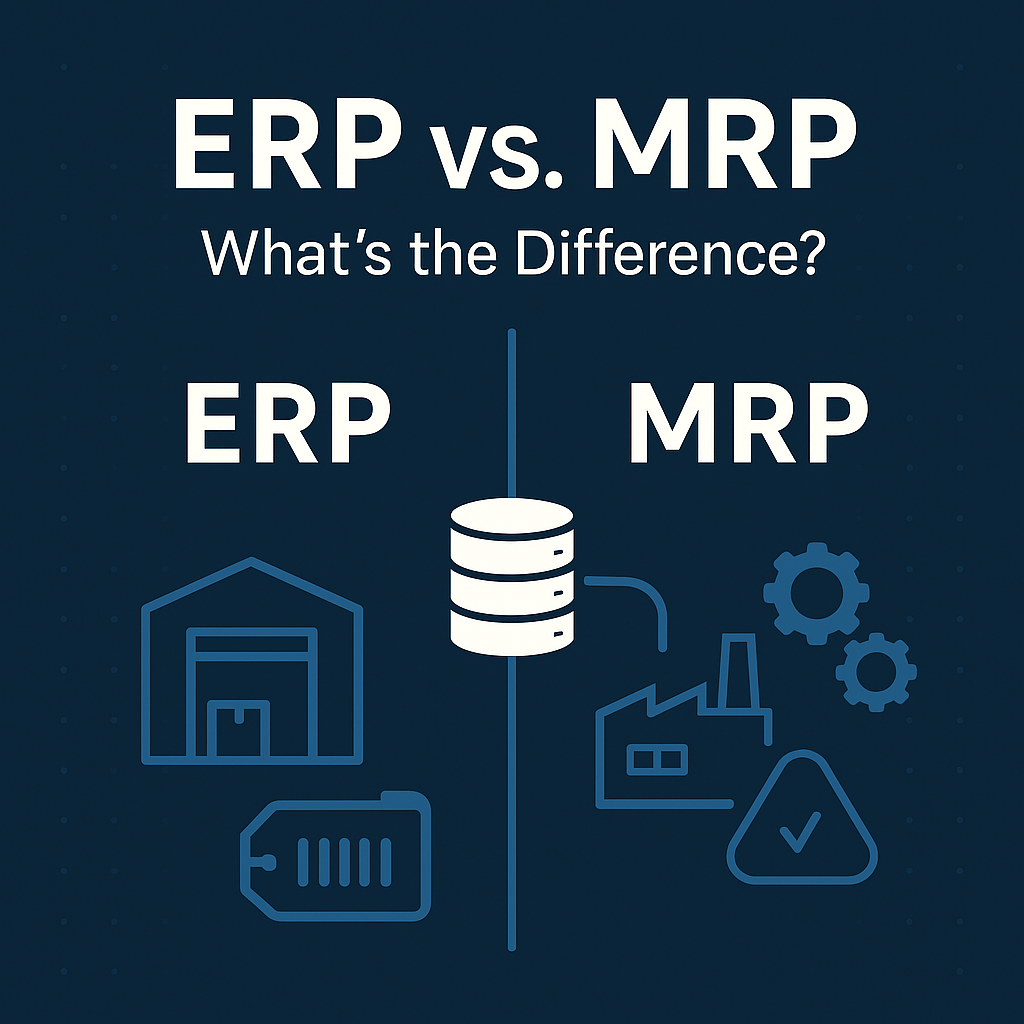ERP vs. MRP: What’s the Difference?
When it comes to managing business operations, choosing the right software system can make or break your efficiency. Two acronyms you’ll frequently encounter are ERP (Enterprise Resource Planning) and MRP (Material Requirements Planning). While they sound similar and share some functionality, these systems serve distinct purposes in modern business operations.
Understanding the difference between ERP and MRP is crucial for making informed decisions about which system—or combination of systems—best fits your organization’s needs. At Bizowie, we help manufacturers and distributors navigate this decision with our comprehensive cloud ERP solution that includes robust manufacturing and distribution capabilities.
What is MRP (Material Requirements Planning)?
Material Requirements Planning (MRP) is a specialized software system designed specifically for manufacturing operations. First developed in the 1960s, MRP focuses on three primary objectives:
- Inventory management: Ensuring you have the right materials at the right time
- Production scheduling: Planning when materials are needed for production
- Purchase planning: Determining what and when to order from suppliers
MRP systems answer critical questions like “What materials do we need?” and “When do we need them?” by analyzing production schedules, bills of materials (BOMs), and current inventory levels.
Key Features of MRP Systems
MRP solutions typically include:
- Bill of materials (BOM) management
- Inventory tracking and control
- Production scheduling
- Material demand forecasting
- Purchase order generation
- Lead time management
Who Needs MRP?
MRP systems are ideal for small to mid-sized manufacturers who need dedicated production planning capabilities but may not require comprehensive enterprise management. If your primary challenge is coordinating materials and production schedules, an MRP system might be sufficient.
What is ERP (Enterprise Resource Planning)?
Enterprise Resource Planning (ERP) is a comprehensive business management platform that integrates multiple core business processes across an entire organization. Think of ERP as an all-in-one solution that connects departments, data, and workflows into a unified system.
Modern ERP systems evolved from MRP, expanding far beyond manufacturing to encompass virtually every aspect of business operations. Cloud-based ERP solutions like Bizowie offer the added advantages of accessibility, scalability, and automatic updates without the burden of managing on-premise infrastructure.
Key Features of ERP Systems
ERP platforms typically integrate:
- Financial management: General ledger, accounts payable/receivable, budgeting
- Human resources: Payroll, benefits, recruitment, performance tracking
- Supply chain management: Procurement, inventory, logistics
- Customer relationship management (CRM): Sales, marketing, customer service
- Manufacturing: Production planning, quality control (includes MRP functionality)
- Project management: Resource allocation, time tracking
- Business intelligence: Reporting, analytics, dashboards
Who Needs ERP?
ERP systems suit growing businesses and enterprises that need to break down departmental silos and create seamless information flow across the organization. If you’re struggling with disconnected systems, data inconsistency, or inefficient cross-departmental processes, ERP may be the answer.
The Key Differences: ERP vs. MRP
| Feature | MRP | ERP |
|---|---|---|
| Scope | Manufacturing-focused | Enterprise-wide |
| Departments | Production, inventory | All departments |
| Functionality | Material planning, scheduling | Finance, HR, CRM, manufacturing, and more |
| Data Integration | Limited to production data | Comprehensive cross-functional integration |
| Complexity | Simpler, specialized | More complex, comprehensive |
| Cost | Generally lower | Higher investment |
| Implementation Time | Shorter | Longer |
| Scalability | Limited growth potential | Highly scalable |
MRP vs. ERP: Which One Do You Need?
Choose MRP if you:
- Run a small to mid-sized manufacturing operation
- Primarily need production and inventory management
- Have a limited budget for software systems
- Want faster implementation with less complexity
- Already have adequate systems for finance, HR, and other functions
Choose ERP if you:
- Need integration across multiple business functions
- Experience data silos between departments
- Plan to scale operations significantly
- Require real-time visibility across the organization
- Want a single source of truth for all business data
- Need advanced analytics and reporting capabilities
The Hybrid Approach
Many businesses actually use both systems in tandem. A standalone MRP system might handle detailed production planning while connecting to an ERP system that manages finances, HR, and customer relationships. This approach offers specialized manufacturing capabilities while maintaining enterprise-wide integration.
Why Cloud ERP Makes Sense for Manufacturers and Distributors
Traditional on-premise ERP systems require significant upfront investment, IT infrastructure, and ongoing maintenance. Cloud ERP solutions like Bizowie eliminate these barriers while delivering enterprise-grade capabilities:
- Lower total cost of ownership: No hardware investments, reduced IT overhead, and predictable subscription pricing
- Faster implementation: Get up and running in weeks instead of months
- Automatic updates: Always access the latest features without disruptive upgrades
- Scalability: Easily add users, locations, or functionality as you grow
- Accessibility: Access your system from anywhere, enabling remote work and multi-site operations
- Enhanced security: Enterprise-grade security and automatic backups without managing infrastructure
For manufacturers and distributors specifically, Bizowie’s cloud ERP platform provides specialized functionality including advanced inventory management, production scheduling, quality control, warehouse management, and supply chain optimization—all in one integrated system.
Making the Transition from MRP to ERP
As manufacturers grow, many outgrow their MRP systems and need to transition to ERP. Common signs it’s time to upgrade include:
- Multiple disconnected software systems creating data inconsistencies
- Manual data entry between systems consuming excessive time
- Inability to get real-time reporting across departments
- Difficulty scaling operations or expanding to new locations
- Increasing compliance and regulatory requirements
The good news? Modern cloud ERP systems like Bizowie include robust MRP functionality, meaning you won’t lose the production planning capabilities you depend on—you’ll enhance them with enterprise-wide integration. With Bizowie’s manufacturing and distribution suite, you get specialized industry functionality combined with the flexibility and scalability of cloud technology.
The Bottom Line
The choice between ERP and MRP isn’t always either/or. MRP systems excel at focused manufacturing planning, while ERP systems provide comprehensive business management across all departments. Your decision should align with your current needs, growth trajectory, and budget.
Small manufacturers with straightforward needs may start with MRP alone. Growing businesses facing complexity across multiple functions will benefit from ERP’s integrated approach. And some organizations find the perfect balance using both systems together.
For manufacturers and distributors looking to scale, a cloud ERP solution offers the best of both worlds: comprehensive business management with specialized manufacturing capabilities, all without the complexity of on-premise infrastructure. Bizowie’s cloud ERP platform delivers robust manufacturing and distribution functionality while providing the flexibility to grow with your business.
Evaluate your pain points, consider your growth plans, and choose the system—or combination—that transforms those challenges into competitive advantages.
Frequently Asked Questions
Can ERP replace MRP?
Yes. ERP systems include MRP functionality and much more. However, some manufacturers prefer specialized MRP tools for their focused capabilities.
Is MRP part of ERP?
In most cases, yes. Modern ERP systems incorporate MRP modules as part of their manufacturing management capabilities.
Which is more expensive, ERP or MRP?
ERP systems typically cost more due to their comprehensive functionality, broader scope, and enterprise-wide implementation requirements.
How long does it take to implement ERP vs. MRP?
MRP implementations typically take 3-6 months, while ERP implementations can take 6-18 months or longer depending on organization size and complexity.
Do I need both ERP and MRP?
Most organizations only need one or the other. However, some businesses integrate specialized MRP systems with ERP platforms to combine focused manufacturing capabilities with enterprise-wide management.
Ready to discover how cloud ERP can transform your manufacturing or distribution business? Bizowie’s comprehensive platform combines powerful manufacturing and distribution capabilities with the flexibility and scalability of the cloud. Learn how we help businesses like yours streamline operations, eliminate data silos, and scale efficiently.
Schedule a demo to see how Bizowie can replace your disconnected systems with one unified solution.

